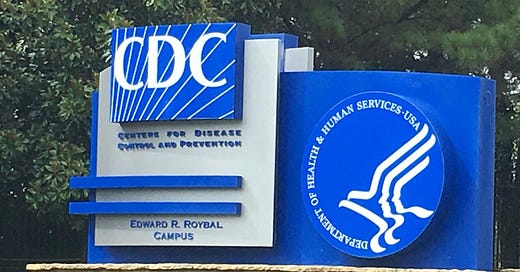The CDC’s New Autism Study: A Deep Dive into Vaccines and Beyond
Exploring Robert F. Kennedy Jr.’s Influence and the Multifactorial Questions Ahead
The U.S. Centers for Disease Control and Prevention (CDC) is gearing up for a major study on autism, set to launch in 2025 under the oversight of the Department of Health and Human Services (HHS). This initiative, reported by outlets like Reuters and Newsweek as of March 10, 2025, aims to investigate potential connections between vaccines and autism spectrum disorder (ASD)—a topic that has stirred debate for decades. With autism diagnoses climbing from 1 in 150 children in 2000 to 1 in 36 by 2020, according to CDC data, public and scientific interest in its causes remains intense. At the helm of HHS is Robert F. Kennedy Jr., a figure whose long-standing skepticism about vaccine safety has thrust him into the spotlight as a key player in shaping this research. Here’s what we know about the plan, RFK Jr.’s role, and the broader questions it might address.
The CDC’s Plan: Scope and Context
The CDC’s study will reportedly leverage the Vaccine Safety Datalink (VSD), a system tracking vaccine outcomes across millions of patients, to explore whether vaccines contribute to autism. This comes amid a measles outbreak in Texas and New Mexico, with over 200 cases and two deaths linked to declining vaccination rates, heightening the stakes of public health narratives. While the CDC and HHS have not released a detailed methodology—leaving questions about funding, timeline, and exact focus—the study appears poised to revisit vaccine safety, a topic extensively studied since the late 1990s. Past research, like the 2002 Madsen cohort study of 537,303 Danish children and the 2019 Hviid study of 657,461 kids, has focused heavily on the MMR vaccine and thimerosal, a mercury-based preservative phased out of most childhood vaccines by 2001. The new study’s scope remains unclear, but its announcement has already sparked discussion about what it might uncover—or rehash.
RFK Jr.’s Role: From Advocate to Policy Influencer
Robert F. Kennedy Jr., confirmed as HHS Secretary in late 2024 with a 52-48 Senate vote, brings a unique perspective to this effort. For nearly two decades, Kennedy has questioned vaccine safety, notably through his 2005 article in Rolling Stone and Salon alleging a thimerosal-autism link. During his confirmation hearings, Kennedy sidestepped disavowing a vaccine-autism link, promising instead to follow data wherever it leads. President Donald Trump, in a March 2025 address to Congress, endorsed Kennedy’s leadership, citing “skyrocketing” autism rates and tasking him with finding answers. As HHS head, Kennedy oversees the CDC’s priorities and resources, giving him significant sway over the study’s direction—though it’s uncertain how directly he’s shaping its design.
Beyond Vaccines: The Multifactorial Question
While vaccines dominate headlines, some researchers and advocates argue the study should probe autism’s multifactorial nature—how genetics, environmental exposures, and developmental timing might intertwine. Autism’s genetic roots are well-documented, with twin studies estimating heritability at 50–90% and hundreds of genes implicated. Environmental factors, like prenatal exposure to pollutants or maternal infections, also play a role, per studies like those from the CDC’s Study to Explore Early Development (SEED). Critics of past vaccine-focused research note its narrow lens—studies like DeStefano et al. (2004) on thimerosal or Taylor et al.’s 2014 meta-analysis of 1.2 million kids didn’t test how vaccines might interact with these other factors. Could a vaccine schedule, combined with genetic predisposition and, say, early toxin exposure, trigger a cascade effect in rare cases? That’s the kind of question some hope the CDC will tackle, though there’s no sign yet it’s moving beyond a vaccine-centric frame.
The Research Landscape: Strengths and Gaps
Past studies offer a foundation but also reveal limits. The Madsen study found autism rates of 0.92% in MMR-vaccinated kids versus 0.83% in unvaccinated ones—no significant difference—but didn’t account for all confounders like socioeconomic status. Hviid’s 2019 work, with a hazard ratio of 0.93, reinforced this, yet its unvaccinated group (5.5% of the cohort) might differ in ways (e.g., parental health beliefs) not fully adjusted for. DeStefano’s case-control study on thimerosal adjusted for some variables but skipped genetics, while Taylor’s meta-analysis pooled diverse data, risking oversight of subgroup effects. These studies have been hailed as debunking broad vaccine-autism ties but they weren’t built to detect complex interactions—leaving a gap the new study could fill if it broadens its scope.
Public and Expert Reactions
The announcement has stirred mixed responses. Public health experts like Alison Singer of the Autism Science Foundation worry it could fuel vaccine hesitancy, diverting focus from what some believe are autism’s true drivers. Advocates like Zoe Gross of the Autistic Self-Advocacy Network, however, see potential in spotlighting underfunded areas like genetic or environmental research. Kennedy’s influence adds a layer of tension; his Fox News comments in 2023—“I do believe autism comes from vaccines”— leaving observers guessing about his agenda.
What’s Next?
As of March 10, 2025, the CDC study’s details are hazy—will it stick to vaccines or explore that multifactorial cascade? Kennedy’s role as HHS Secretary ensures his voice will loom large, whether he’s hands-on with the study or simply setting its tone. With autism’s rising prevalence and a public hungry for answers, this effort could reshape how we understand ASD’s causes—or reignite old debates. Stay tuned as the CDC fleshes out its plan; the stakes, from vaccination rates to research dollars, couldn’t be higher.





